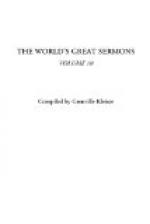Then, after the work of education, of creation, of pity, comes the work of severity, of punishment, of destruction. The voice has been compared to a sword. Like it, it flames and punishes. A voice is Nathan rising up before the criminal king and calling down upon his head the avenging lightning of this word: “Thou art the man!” The sword attacks, destroys, but it defends, also, and this is its fairest work. Never is the voice more touching than when it is lifted in favor of the weak, and, when, suddenly, in the midst of the iniquities of brute force that it denounces, marks with its stigma, it causes justice to shine forth and the truth to be felt, in the holy soul-traversing thrill, that God Himself is there and that His hour has come!
A voice has its echo. When this echo is sympathetic, it is endowed with the sweetest recompense and obliterates the memory of many sorrows. But this echo is often hostile. It arises from wrath and is increased by hatred. Then it is resistance, riot, that rumbles. It is the passions and the scourged vices that twist and bellow like deer under the lash of the trainer. How many times, O, faithful voices, souls of peace and truth, has the spirit that animates you driven you to these fearful encounters—you who have heard in the silence of your hearts the holy verities and who know their worth, you are obliged to go bearing them in the face of menace, of mockery, of trembling rage where they seem to us like Daniel in the lion’s den! A terrible ordeal! but one before which the testifying voices have never recoiled. Luther, who knew the emotions of the great battles of the spirit where one man is alone in the face of a thousand, where tinder the growing clamors and the cries of death ... a voice struggles like a torch in a tempest, has given to the servants of truth a counsel that is the alpha and omega of their austere mission. When they have said all, done all, essayed all, put all their being and all their love into the proclamation of what they have to announce, then, he says, “let them be ready to be hooted at and spat upon!” And not only should they be ready but they should accept this lot with happiness. Christ says to them: “Happy are they that are outraged and persecuted for the sake of justice!”
Alas, the rudest proof for him who speaks the truth is not to arouse indignation. That, at least, is a result, and however sad it may be, it bears witness to him who has spoken. Certain protests, despite their fury, are a sort of involuntary homage. The supreme trial for a voice is indifference. When John called himself a voice in the wilderness, he alluded to that external solitude where his voice was raised. But this solitude, on certain days was full of life and the gospel cites for our benefit certain facts which prove that the words with which it resounded were not lost in the empty spaces. They moved and struck home from the humblest regions of society to the exalted spheres, to the royal throne




